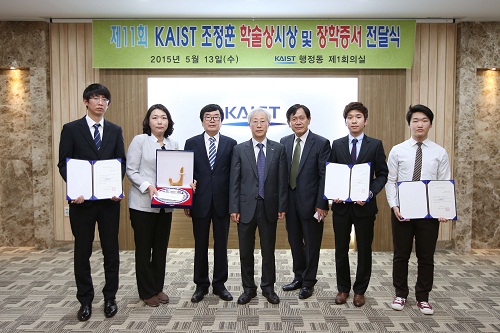people
Doctor Gyu-Tae Kim from General Electric (GE) received the eleventh Cho Jeong-Hoon Academic Award. The award ceremony took place in the main conference room of the administration building on campus on May 13, 2015.
Dr. Kim, a graduate of KAIST, conducts research in the field of instable swirl combustion of gas turbines and has contributed to the development of aircraft engines. He earned his name as a researcher by identifying, for the first time in the world, the correlation between the thermoacoustic instability of gas turbine engines and the complex response of swirl flames.
Along with Dr. Kim, Shin-Jae Kang of the Aerospace Engineering Department, KAIST, Yong-Gyun Bae of the Mechanical Engineering Department, Korea University, and Ji-Won Kim from Kongju National University High School, received the Cho Jeong-Hoon scholarship.
The award was created in commemoration of Cho Jeong-Hoon who was killed in an explosion during his research at the KAIST Rocket Laboratory on May 13, 2003. Cho’s parents donated USD 450,000 to KAIST in his memory. Since 2005, a total of four students from KAIST, Korea University, and Kongju National University High School, all of which the late Honorary Doctor Cho attended, have received the scholarship.

-
event KAIST Takes the Lead in Developing Core Technologies for Generative AI National R&D Project
KAIST (President Kwang Hyung Lee) is leading the transition to AI Transformation (AX) by advancing research topics based on the practical technological demands of industries, fostering AI talent, and demonstrating research outcomes in industrial settings. In this context, KAIST announced on the 13th of August that it is at the forefront of strengthening the nation's AI technology competitiveness by developing core AI technologies via national R&D projects for generative AI led by the Minis
2025-08-13 -
event 'Team Atlanta', in which KAIST Professor Insu Yun research team participated, won the DARPA AI Cyber Challenge in the US, with a prize of 5.5 billion KRW
<Photo1. Group Photo of Team Atlanta> Team Atlanta, led by Professor Insu Yun of the Department of Electrical and Electronic Engineering at KAIST and Tae-soo Kim, an executive from Samsung Research, along with researchers from POSTECH and Georgia Tech, won the final championship at the AI Cyber Challenge (AIxCC) hosted by the Defense Advanced Research Projects Agency (DARPA). The final was held at the world's largest hacking conference, DEF CON 33, in Las Vegas on August 8 (local time)
2025-08-10 -
research Anti-Neuroinflammatory Natural Products from Isopod-Related Fungus Now Accessible via Chemical Synthesis
<(From left) Professor Sunkyu Han, Ph.D candidate Yoojin Lee, Ph.D candidate Taewan Kim> "Herpotrichone" is a natural substance that has been evaluated highly for its excellent ability to suppress inflammation in the brain and protect nerve cells, displaying significant potential to be developed as a therapeutic agent for neurodegenerative brain diseases such as Alzheimer's disease and Parkinson's disease. This substance could only be obtained in minute quantities from fungi that are
2025-08-04 -
research KAIST Team Develops Optogenetic Platform for Spatiotemporal Control of Protein and mRNA Storage and Release
<Dr. Chaeyeon Lee, Professor Won Do Heo from Department of Biological Sciences> A KAIST research team led by Professor Won Do Heo (Department of Biological Sciences) has developed an optogenetic platform, RELISR (REversible LIght-induced Store and Release), that enables precise spatiotemporal control over the storage and release of proteins and mRNAs in living cells and animals. Traditional optogenetic condensate systems have been limited by their reliance on non-specific multivalent
2025-07-23 -
research Why Do Plants Attack Themselves? The Secret of Genetic Conflict Revealed
<Professor Ji-Joon Song of the KAIST Department of Biological Sciences> Plants, with their unique immune systems, sometimes launch 'autoimmune responses' by mistakenly identifying their own protein structures as pathogens. In particular, 'hybrid necrosis,' a phenomenon where descendant plants fail to grow healthily and perish after cross-breeding different varieties, has long been a difficult challenge for botanists and agricultural researchers. In response, an international research te
2025-07-21